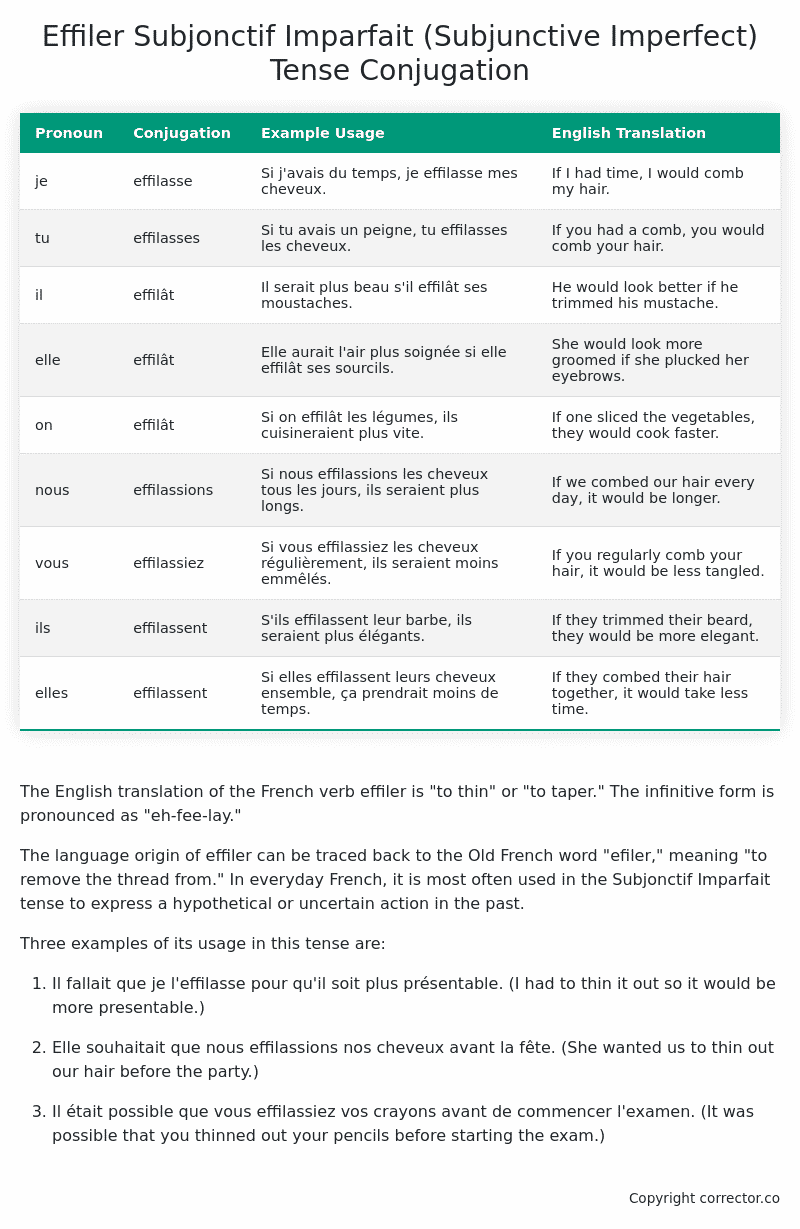Subjonctif Imparfait (Subjunctive Imperfect) Tense Conjugation of the French Verb effiler
Introduction to the verb effiler
The English translation of the French verb effiler is “to thin” or “to taper.” The infinitive form is pronounced as “eh-fee-lay.”
The language origin of effiler can be traced back to the Old French word “efiler,” meaning “to remove the thread from.” In everyday French, it is most often used in the Subjonctif Imparfait tense to express a hypothetical or uncertain action in the past.
Three examples of its usage in this tense are:
-
Il fallait que je l’effilasse pour qu’il soit plus présentable. (I had to thin it out so it would be more presentable.)
-
Elle souhaitait que nous effilassions nos cheveux avant la fête. (She wanted us to thin out our hair before the party.)
-
Il était possible que vous effilassiez vos crayons avant de commencer l’examen. (It was possible that you thinned out your pencils before starting the exam.)
Table of the Subjonctif Imparfait (Subjunctive Imperfect) Tense Conjugation of effiler
| Pronoun | Conjugation | Example Usage | English Translation |
|---|---|---|---|
| je | effilasse | Si j’avais du temps, je effilasse mes cheveux. | If I had time, I would comb my hair. |
| tu | effilasses | Si tu avais un peigne, tu effilasses les cheveux. | If you had a comb, you would comb your hair. |
| il | effilât | Il serait plus beau s’il effilât ses moustaches. | He would look better if he trimmed his mustache. |
| elle | effilât | Elle aurait l’air plus soignée si elle effilât ses sourcils. | She would look more groomed if she plucked her eyebrows. |
| on | effilât | Si on effilât les légumes, ils cuisineraient plus vite. | If one sliced the vegetables, they would cook faster. |
| nous | effilassions | Si nous effilassions les cheveux tous les jours, ils seraient plus longs. | If we combed our hair every day, it would be longer. |
| vous | effilassiez | Si vous effilassiez les cheveux régulièrement, ils seraient moins emmêlés. | If you regularly comb your hair, it would be less tangled. |
| ils | effilassent | S’ils effilassent leur barbe, ils seraient plus élégants. | If they trimmed their beard, they would be more elegant. |
| elles | effilassent | Si elles effilassent leurs cheveux ensemble, ça prendrait moins de temps. | If they combed their hair together, it would take less time. |
Other Conjugations for Effiler.
Le Present (Present Tense) Conjugation of the French Verb effiler
Imparfait (Imperfect) Tense Conjugation of the French Verb effiler
Passé Simple (Simple Past) Tense Conjugation of the French Verb effiler
Passé Composé (Present Perfect) Tense Conjugation of the French Verb effiler
Futur Simple (Simple Future) Tense Conjugation of the French Verb effiler
Futur Proche (Near Future) Tense Conjugation of the French Verb effiler
Plus-que-parfait (Pluperfect) Tense Conjugation of the French Verb effiler
Passé Antérieur (Past Anterior) Tense Conjugation of the French Verb effiler
Futur Antérieur (Future Anterior) Tense Conjugation of the French Verb effiler
Subjonctif Présent (Subjunctive Present) Tense Conjugation of the French Verb effiler
Subjonctif Passé (Subjunctive Past) Tense Conjugation of the French Verb effiler
Subjonctif Imparfait (Subjunctive Imperfect) Tense Conjugation of the French Verb effiler (this article)
Subjonctif Plus-que-parfait (Subjunctive Pluperfect) Tense Conjugation of the French Verb effiler
Conditionnel Présent (Conditional Present) Tense Conjugation of the French Verb effiler
Conditionnel Passé (Conditional Past) Tense Conjugation of the French Verb effiler
L’impératif Présent (Imperative Present) Tense Conjugation of the French Verb effiler
L’infinitif Présent (Infinitive Present) Tense Conjugation of the French Verb effiler
Struggling with French verbs or the language in general? Why not use our free French Grammar Checker – no registration required!
Get a FREE Download Study Sheet of this Conjugation 🔥
Simply right click the image below, click “save image” and get your free reference for the effiler Subjonctif Imparfait tense conjugation!

Effiler – About the French Subjonctif Imparfait (Subjunctive Imperfect) Tense
Formation
Common Everyday Usage Patterns
Interactions with Other Tenses
Subjonctif Présent
Indicatif Passé Composé
Conditional
Conditional Perfect
Summary
I hope you enjoyed this article on the verb effiler. Still in a learning mood? Check out another TOTALLY random French verb conjugation!


